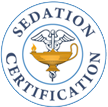New Mexico Board of Nursing Review – 12/13/2022
Reviewed by Sedation Certification – January 9, 2024
State Sedation Policy – Yes
Can RN’s give sedation? – Yes
Can RN’s give anesthetic medications? – No
https://www.srca.nm.gov/parts/title16/16.012.0002.html
New Mexico Nursing Practice Act
(1) RNs may assume specific functions and perform specific procedures which are beyond basic nursing preparation for professional registered nursing Subsection J of Section 61-3-3 NMSA 1978 provided the knowledge and skills required to perform the function and procedure emanates from a recognized body of knowledge and practice of nursing, and the function or procedure is not prohibited by any law or statue.
(2) When assuming specific functions and performing specific procedures, which are beyond the nurse’s basic educational preparation, the RN is responsible for obtaining the appropriate knowledge, skills and supervision to assure he/she can perform the function/procedure safely and competently.
(a) administration of medication for the purposes of procedural sedation and analgesia requires particular attention;
(b) a nurse shall possess specialized nursing knowledge, judgment, skill and current clinical competence to manage the nursing care of the patient receiving procedural sedation including:
(i) being currently trained with demonstrated proficiency in ACLS or PALS;
(ii) knowledge of anatomy, physiology, pharmacology, cardiac arrhythmia recognition, oxygen delivery, respiratory physiology, transport and uptake and the use of an oxygen mask, bag-valve mask, oral airway, nasal airway adjunct, or the maintenance of a supraglottic airway, or endotracheal tube;
(iii) ability to recognize emergency situations and institute emergency procedures as appropriate to the patient condition and circumstance.
(c) To perform procedural sedation a registered nurse:
(i) shall not have other responsibilities during or after the procedure that would compromise the nurse’s ability to adequately monitor the patient during procedural sedation/analgesia;
(ii) shall assess the physical setting for safe administration of medications for sedation and proceed only if the resources needed for reasonable anticipated emergencies are available;
(iii) shall ensure that a qualified airway specialist is readily available during and after the procedure for respiratory emergencies. A qualified airway specialist is trained in and maintains a current competency in endotracheal intubation, such as but not limited to a CRNA, anesthesiologist, emergency physician, paramedic, respiratory therapist or a registered nurse;
(iv) shall decline to administer medications classified as sedatives or other medication if the registered nurse assesses the administration of sedatives or other medication would be unsafe under the circumstances;
(v) shall maintain adequate oxygenation and ventilation via an appropriate method.
From the NEW MEXICO NURSING PRACTICE ACT:
61-3-6. Administration of anesthetics.
It is unlawful for any person, other than a person licensed in New Mexico to practice medicine, osteopathy or dentistry or a currently licensed certified registered nurse anesthetist, to administer anesthetics to any person. Nothing in this section prohibits a person currently licensed pursuant to the Nursing Practice Act from using hypnosis or from administering local anesthetics or moderate sedation.
For questions please contact http://nmbon.sks.com/
